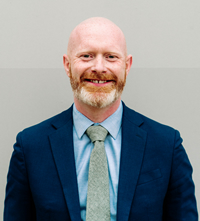Find a CBT Therapist
Search through our directory of local clinicians.
Kevin Ashworth

Featured Therapist Interview
Kevin Ashworth (he/him/his) is a licensed therapist, Co-Founder and Clinical Director of NW Anxiety Institute, a specialty anxiety clinic in Portland, Oregon. He is also an adjunct professor in the department of psychological sciences at the University of Portland. NW Anxiety Institute focuses on the treatment of Obsessive-Compulsive Disorder (OCD) and anxiety disorders in children, adolescents, and adults and is committed to provided culturally competent cognitive-behavioral therapy (CBT). NW Anxiety Institute offers outpatient individual therapy as well as daily groups for individuals across the lifespan and a 6-week intensive outpatient program for adolescents and adults. They are 100% telehealth during the pandemic.
Kevin has worked for the past decade with children, teens, adults, and families who live with anxiety disorders; he specializes in the delivery of CBT and exposure therapies. Kevin presents regularly on topics of anxiety, parenting, and CBT, and is passionate about helping individuals overcome their fears and change their relationship with anxiety. Kevin is an immigrant to the United States; he moved to the USA as a child after his family was chosen from a green-card lottery system.
For more on Kevin and NW Anxiety Institute, see www.nwanxiety.com and https://www.dropbox.com/s/0gufcx2z0lwskqj/IMG_3430.MOV?dl=0
First, we would like to know a little about your practice
What are your personal strengths as a practitioner?
My personal strengths include merging creativity, humor, and warmth with the necessary psychoeducation, research, and scientific information for my clients. This combination helps clients access their experiences of vulnerabilities when we first meet and/or work through their “yuck.” I balance the use of relevant examples and metaphors similar to my clients’ experiences to highlight teachings and integrate therapy principles into my clients’ lives.
What “tips” can you offer to colleagues just opening a practice?
My tip would be to find a niche, stick with it, and become very competent in that area. Quite quickly the word will spread, and you will have established yourself as the person to see. I’d also recommend saying “yes” to as many community events, speaking opportunities, or teaching opportunities as you can.
How do you remind your patients of their strengths during the therapy process?
I typically remind my clients of their strengths through Socratic questioning. For many, it doesn’t feel natural to attend to the things they are good at. My goal is to help them identify these things by inquiring about what has worked and what has not. I remind them often that the experience of anxiety is not a failure, but evidence they are doing something hard.
We would also like to know a little about you personally.
Who was your mentor?
My mentor was a psychologist named Johan Rosqvist, PsyD. He specialized in anxiety disorders before passing away tragically. Since then, I’ve had many others who have been extremely helpful and valuable in my personal growth.
When not practicing CBT, what do you do for fun?
I enjoy reading, home projects, and spending time with my family. I enjoy adventuring on my motorcycle and feeling connected to the world, usually through dust and rain.
We are also interested in some of your views of CBT.
What do you think is the single most important thing CBT can do for your clients?
CBT allows clients to use data and evidence to test perceived anxieties. This helps reframe “yucky” experiences as opportunities of tolerance.
Where do you see the field of the behavioral therapies going over the next 3-5 years?
I hope to see the field moving away from 1-hour weekly therapy. For some, it’s not enough and for others it’s too much at one time. Behavioral change requires daily attention. A therapy structure that offers daily check-ins, quick consults, and intermittent experiences of encouragement may prove to be more successful.
How do you use the local or social media to educate your community on the benefits of CBT?
We use Facebook, Instagram, and YouTube to share the conversation of CBT and behavioral principles. I provide many presentations to schools, communities, and business on topics of anxiety and behavioral change.
Finally, we would like to know your opinions about ABCT.
How long have you been a member of ABCT?
Three years.
How has ABCT helped you professionally?
I have benefited greatly from the publication that is part of the membership. It is helpful to maintain a pulse on the field and hear about other clinicians and new research.
What services do you consider the most valuable from ABCT?
Their publications.
What service(s) are missing from ABCT in your role as a practitioner?
Thank you for taking the time to answer our questions!
My Account Info
Manage your Membership information, email preferences, and more.
Journals
Membership in ABCT grants you access to three journals.
Convention
We are now accepting Abstract submissions for Continuing Education Ticketed Sessions at the 2024 ABCT Convention in Philadelphia, PA.
My Account Info
Manage your Membership information, email preferences, and more.
Journals
Membership in ABCT grants you access to three journals.
Convention
We are now accepting Abstract submissions for Continuing Education Ticketed Sessions at the 2024 ABCT Convention in Philadelphia, PA.
